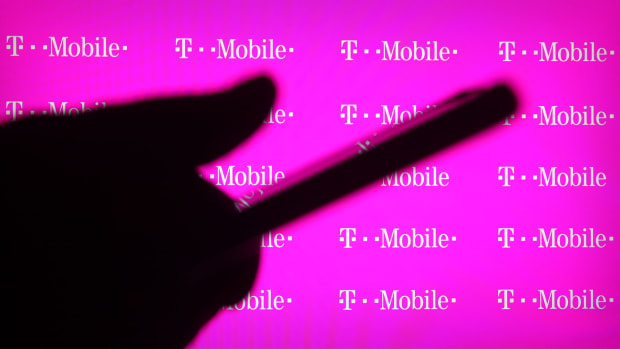T-Mobile has made its mark by taking on the accepted conventions of the mobile phone industry. The company, under former CEO John Legere, set itself up as a rival to industry leaders AT&T (T) and Verizon (VZ) by pointing out just how not customer friendly their practices that were.
That led to T-Mobile forcing the industry to get rid of overages, long-term contracts, and a variety of other practices that consumers hated. Now, under new CEO Mike Sievert, the wireless carrier wants to get rid of another major customer pain point -- dead zones.
To do that, it's partnering with Elon Musk's SpaceX, but it's also welcoming its rivals around the world to help be part of the solution.
The new service, "Coverage Above and Beyond," will use SpaceX’s constellation of satellites in low Earth orbit, and T-Mobile’s wireless network, to" provide near complete coverage in most places in the U.S. – even in many of the most remote locations previously unreachable by traditional cell signals."
The two companies aren't looking to simply end dead zones in the U.S., but anywhere on the planet.
“The important thing about this is that it means there are no dead zones anywhere in the world for your cell phone,” said SpaceX Chief Engineer Elon Musk. “We’re incredibly excited to do this with T-Mobile.”

Images/LightRocket via Getty Images
Smart Phone Dead Zones Are a Big Problem
While mobile phone service has steadily improved in the United States, dead zones still exist. Once you leave the U.S., however, there are huge areas where your phone is basically just dead weight.
That's a problem that T-Mobile (TMUS) acknowledges.
Today, despite powerful LTE and 5G wireless networks, well over half a million square miles of the U.S. in addition to vast stretches of ocean are untouched by cell signals … from ANY provider. And as anyone who has ever encountered a mobile dead zone knows, the wireless industry has struggled to cover these areas with traditional terrestrial cellular technology, most often due to land-use restrictions (e.g. National Parks), terrain limits (e.g. mountains, deserts and other topographical realities) and America’s sheer vastness.
Current technology makes the only real option in those areas satellite phones, which are impractical at best. T-Mobile and SpaceX's new technology won't require customers to use a different device.
"The service aims to work with the phone already in your pocket. The vast majority of smartphones already on T-Mobile’s network will be compatible with the new service using the device’s existing radio. No extra equipment to buy. It just works.," T-Mobile shared in a press release.
T-Mobile Invites Its Rivals to Help
T-Mobile and Starlink's partnership "will create a new network, broadcast from Starlink’s satellites using T-Mobile’s mid-band spectrum nationwide. This true satellite-to-cellular service will provide nearly complete coverage almost anywhere a customer can see the sky," the companies explained.
"Coverage Beyond is all about connecting people all around the world," Sievert said during a press conference. "...It's a lot like putting a cellphone tower in the sky, just a lot harder."
But, no network, even one using satellites can offer total global coverage, so T-Mobile has invited its rivals around the world to participate.
"It's something that we'd like to work in all the territories of foreign nations as well," Sievert added. "This is something we're doing, we're issuing a 'call to carriers worldwide.' Tonight's announcement is an offer for reciprocal roaming with carriers worldwide."
That's a bold invitation that would, in theory, welcome T-Mobile's global rivals (probably not including domestic carriers AT&T and Verizon) to be able to use its network in exchange for the Un-carrier's customers having access to theirs.
"If they would like to do something similar to what we're doing with mid-band spectrum dedicated to SpaceX's [satellites], we will be able to offer reciprocal roaming to them," he said. "...Our vision and our dream is ubiquitous global coverage."







